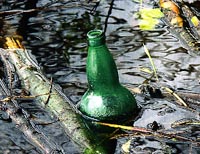Revive litter-collection schemes to save ‘trashed’ British countryside
We need traditional Saturday morning litter picks and 1950s-style penny-for-a-bottle schemes to solve the problem of rubbish in the country, say heritage campaigners


A new report reveals the worrying scale of littering in Britain, and the damaging effect that it has on our economy. Businesses in the dirtiest areas are losing trade, and a 500% increase in rubbish on the streets costs local taxpayers £500 million a year to tackle.
The report, by the Campaign to Protect Rural England (CPRE) and think tank Policy Exchange, also suggests that the increase in rubbish harms social cohesion, fuelling anti-social behaviour and crime in many areas.
One solution put forward by the report is the introduction of bottle and can collection schemes. Such schemes, where customers return bottles or cans in exchange for a small reward, were common in Britain until the 1980s, when they were phased out with the introduction of cheaper containers such as plastic.
American travel writer Bill Bryson, who is president of the CPRE, says: ‘It is truly exasperating that we can routinely trash a country that is so rich in natural, cultural and built heritage.
‘Nowhere in the world is there a landscape more lovely to behold, more comfortable to be in, more artfully worked, more visited and walked across and gazed upon than the countryside of Britain.’
Mr Bryson, who lives in the Yorkshire Dales, claims to have witnessed a ‘rising tide of litter and detritus’ since he moved to Britain 30 years ago. He is now leading a campaign called Stop the Drop, urging communities to organise waste collection and enforce more effective penalties for litterers.
‘The recycling rate for this country, although much improved in recent years, still lags behind many of our European partners,’ says Mr Bryson, ‘and we are world leaders in litter.’
Exquisite houses, the beauty of Nature, and how to get the most from your life, straight to your inbox.
The author would like to see a revival of the traditional ‘best kept village’ competitions: ‘We must build civic pride in clean and tidy environments, with towns, villages and parishes competing to be spotless.’
To comment on this article, use the comment box below, or email us at clonews@ipcmedia.com. Read more about the countryside.
Country Life is unlike any other magazine: the only glossy weekly on the newsstand and the only magazine that has been guest-edited by His Majesty The King not once, but twice. It is a celebration of modern rural life and all its diverse joys and pleasures — that was first published in Queen Victoria's Diamond Jubilee year. Our eclectic mixture of witty and informative content — from the most up-to-date property news and commentary and a coveted glimpse inside some of the UK's best houses and gardens, to gardening, the arts and interior design, written by experts in their field — still cannot be found in print or online, anywhere else.
